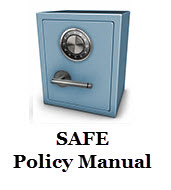|
|
State Accounting Fiscal Essentials . SAFE Policy Manual |
Revised: 08/04/2023 |
|
|
State Accounting Fiscal Essentials . SAFE Policy Manual |
Revised: 08/04/2023 |
Applicable or Related Code Sections
ORC 3.12 - Personal liability of officer making contract without authority
ORC 126.07 - Certification of balance statement in all contracts
ORC 126.08 - Director of Budget and Management – Powers and Duties
ORC 126.15 - Adjusting Capital or Operating Budgets
ORC 131.33 - Unexpended balances
House Bill 33, Main Operating Budget FY2024-FY2025 - Section 503.50 Reappropriation of Unexpended Encumbered Balances of Operating Appropriations
This policy addresses the basis of operating encumbrances, their use and modification, and the length of time encumbrances can legally stay open before they are canceled.
The terms of this policy apply to all state agencies, boards, and commissions for expenditures made from funds within the state treasury.
An encumbrance reserves appropriation to allow for the future payment of an agency’s legal obligations. An encumbrance is not valid until a requisition undergoes all approvals, passes all budget checks by receiving certification that there is available appropriation, and is dispatched to a purchase order in OAKS. All purchases must serve a “public purpose” and fall within the mission of the agency.
In most cases, encumbrances should be supported by a contract, agreement, obligation, resolution, or order to be performed in the current fiscal year. An agency may find it advantageous to do a blanket purchase order to set aside appropriation for known reoccurring charges throughout the fiscal year; therefore, these types of encumbrances may lack specific support other than the logic for the amount encumbered. To use a blanket purchase order, secondary purchase orders must be generated that reference the initial blanket encumbrance.
An agency must put procedures in place to document the delegation of authority to personnel authorized to make contracts, agreements, or obligations involving the expenditure of money chargeable to an appropriation. In addition, the agency must document that these delegated personnel are aware of ORC 3.12 and ORC 126.07 regarding personal liability.
A valid encumbrance shall not be used for any purpose other than indicated on the encumbering document. If a circumstance arises that changes the original obligation, the agency should evaluate whether it is appropriate to modify or cancel/close the encumbrance.
Agencies are unable to modify purchase orders outside of the current fiscal year in which the encumbrance was originally made. Agencies are also unable to modify purchase orders if a payment voucher has been created against it in the current fiscal year. Under certain limited circumstances, such as through legal authority granted in an act of the General Assembly, agencies can cancel and reestablish encumbrances or parts of encumbrances in the appropriate funds and appropriation line items for the same purposes and payees. Agencies can perform these acts through the director of the Office of Budget and Management (OBM).
Unexpended balances of operating appropriations that an agency lawfully encumbered prior to the close of a fiscal year are available the first day of July of the following fiscal year only for the purposes of expending the encumbrance. Expenditures referencing prior year encumbrances in the subsequent fiscal year must directly relate to activities and/or commitments from that previous fiscal year. When encumbering funds to complete facility or maintenance projects (account category 520), agencies should properly plan and allow sufficient time for project completion. Agencies may not use a previous fiscal year purchase order for activities or obligations that occur in the next fiscal year, except in the case of subsidies.
Prior fiscal year operating encumbrances for purchased personal services (account category 510), maintenance (account category 520), equipment (account category 530), or items for resale (account category 560) may stay open for five months from the end of the fiscal year (November 30) for the purposes of paying the liability incurred in the prior fiscal year. OBM is required by law to cancel these prior fiscal year operating encumbrances no later than the weekend following November 30 each year, with the following exceptions:
The Director of OBM reports to the Controlling Board by December 31st of each year the operating appropriations for which unexpended balances remain beyond a five-month period from the end of the fiscal year. The report is updated on a quarterly basis for encumbrances remaining open.
